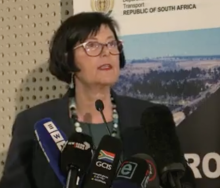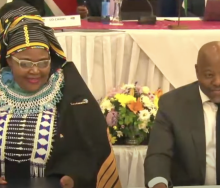Two executives from South Africa’s agricultural sector have denounced weekend reporting by a prominent media house that apparently misrepresented Gazetted information about the requirements for exports to the UK and European Union.
Over the weekend economist Wandile Sihlobo of Agbiz and Wine SA CEO, Rico Basson, took to social media to voice their concern about the reports, saying it was untrue that white farmers faced exclusion from export permits on the basis of not complying with black economic empowerment (BEE) regulations.
According to one report published in City Press, “farms that are ‘too white’ will no longer be allowed to export to the UK and the EU”.
It added that the amended “rules apply to a range of products.”
Its sister paper, Rapport, the most influential Afrikaans-language Sunday paper in South Africa, ran a lead story headlined: “Wit boerderye mag nie uitvoer, sê staat” (White farms may not export, state says).
It is not certain that any other holding company, besides Media 24, owners of City Press and Rapport, carried similar stories.
News 24, an online entity owned by the same company, had a headline that said: “Outrage at new BEE agricultural export rules.”
Considering the alarmist, race-based nature of the reports, Sihlobo and Basson denounced the stories on the same day it was published, November 12.
In an effort to set the record straight on behalf of the Department of Agriculture, Land Reform & Rural Development (DALRRD), Sihlobo has since then circulated a ministerial statement about the matter.
The statement says: “The DALRRD recently published two gazettes outlining the procedure for exports from SACU (Southern African Customs Union) and Mozambique to the EU and the UK, respectively, to take advantage of preferential Tariff Rate Quotas (TRQ) for certain agricultural and agro-processed products.”
More importantly, the department said: “The weekend newspapers misrepresented the government’s message about the procedure and annual application for export permits to the European Union and United Kingdom markets.”
The DALRRD statement proceeds to contextualise the origin of TRQs, adding that the “allocation of these quota (sic) take into account the market share of the applicants, the quote applied for, the total available quota, the number of applicants and the BBBEE (broad-based black economic empowerment) status of the applicant.”
It continues to stress that “the requirements are not new and mirror the previous years’ requirements.”
It goes on to say that there is no threshold for export permit applicants to apply to, and that BBBEE is but one element to the TRQ awarding process.
Although denying any untoward exclusionary intent to the Gazetted information, the DALRRD said: “The impact and effectiveness of these vital trade agreements (TRQs) are currently being reviewed with an eye to extending and improving upon them.”
It furthermore asked that information with a sensitive nature not be misrepresented by political parties.
“We (...) urge all stakeholders to seek correct and factual information from the department before making any comments,” the DALRRD said.
It ended the statement by saying “all farmers” will continue to enjoy access to markets in the EU and UK.
Since Sihlobo and Basson first pointed out the misrepresentation of facts, the news titles involved have not retracted or corrected their reports.













